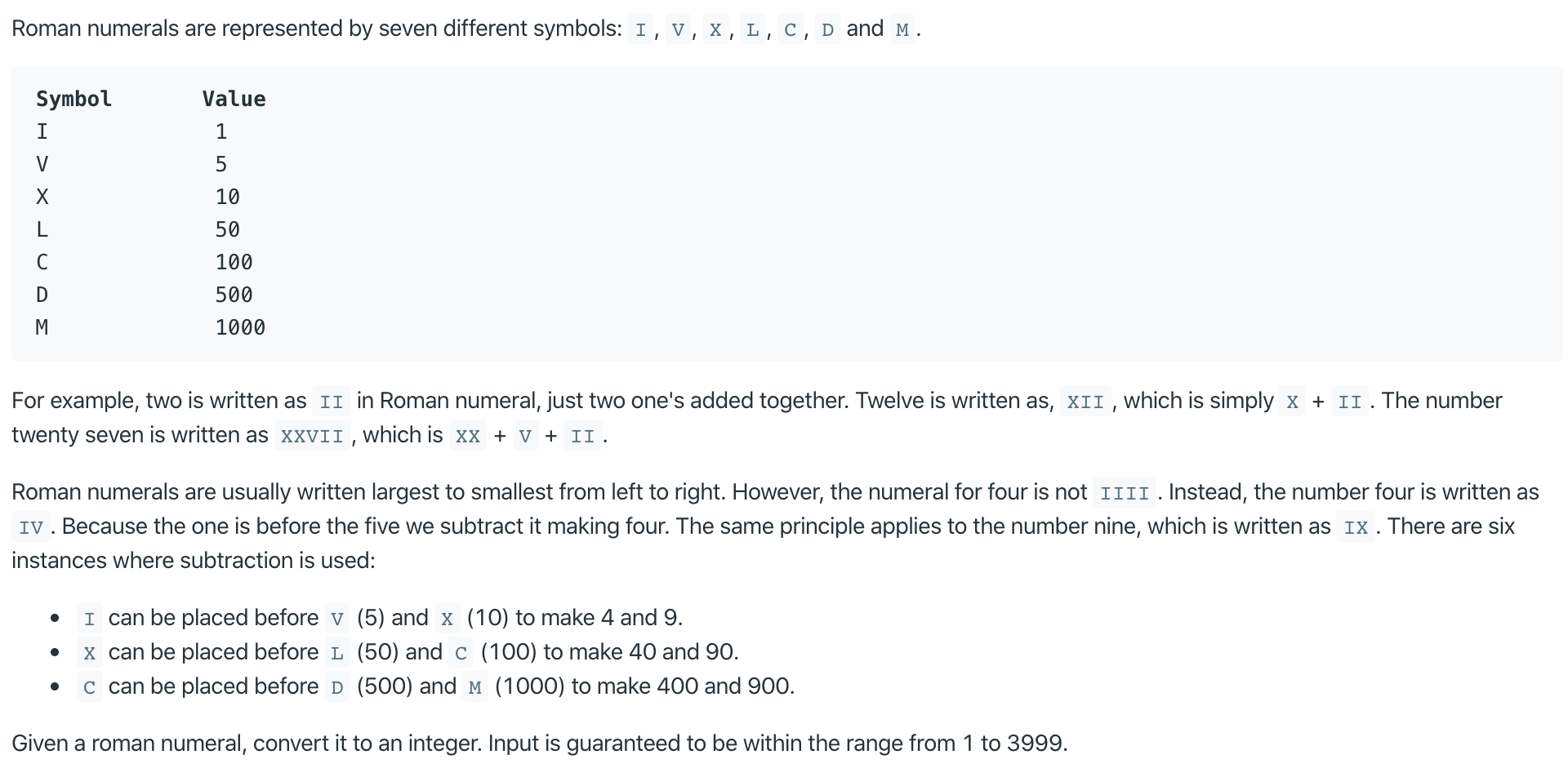Roman to Integer
franklinqin0 MathString

# Solution
All following three solutions take linear time.
# Many if/else Statements w/ Dictionary
I came up w/ the following solution at first:
def romanToInt(self, s: str) -> int:
dict = {'I': 1,
'V': 5,
'X': 10,
'L': 50,
'C': 100,
'D': 500,
'M': 1000}
i = len(s)-1
sum = 0
while (i>0):
cur = s[i]
pre = s[i-1]
if cur=='V' and pre=='I':
sum += 4
i -= 2
elif cur=='X' and pre=='I':
sum += 9
i -= 2
elif cur=='L' and pre=='X':
sum += 40
i -= 2
elif cur=='C' and pre=='X':
sum += 90
i -= 2
elif cur=='D' and pre=='C':
sum += 400
i -= 2
elif cur=='M' and pre=='C':
sum += 900
i -= 2
else:
sum += dict[cur]
i -= 1
if i == 0:
sum += dict[s[0]]
return sum
1
2
3
4
5
6
7
8
9
10
11
12
13
14
15
16
17
18
19
20
21
22
23
24
25
26
27
28
29
30
31
32
33
34
35
36
37
2
3
4
5
6
7
8
9
10
11
12
13
14
15
16
17
18
19
20
21
22
23
24
25
26
27
28
29
30
31
32
33
34
35
36
37
# Less if/else Statements w/ Dictionary
Then I had two observations:
- the final
ifis quite annoying -> iterateifromlen(s)-1to 0, comparecurandnextinstead - positive number if
cur>next, negative number ifcur<next-> much lessif/elsestatements
Despite shorter code and cleaner logic, there is not much difference in runtime.
def romanToInt(self, s: str) -> int:
dict = {'I': 1,
'V': 5,
'X': 10,
'L': 50,
'C': 100,
'D': 500,
'M': 1000}
i = len(s)-2
sum = dict[s[-1]]
while i>-1:
cur = s[i]
nxt = s[i+1]
if dict[cur]>=dict[nxt]:
sum += dict[cur]
else:
sum -= dict[cur]
i -= 1
return sum
1
2
3
4
5
6
7
8
9
10
11
12
13
14
15
16
17
18
19
2
3
4
5
6
7
8
9
10
11
12
13
14
15
16
17
18
19
# Switch Statements w/o Dictionary
We could've used switch statements to avoid initializing the dict and so many if/else statements. Logic needs to update since we had both cur and nxt rather than 1 var.
Since Python doesn't have switch statements, here is a Java solution:
public static int romanToInt(String s) {
int res = 0;
for (int i = s.length() - 1; i >= 0; i--) {
char c = s.charAt(i);
switch (c) {
case 'I':
res += (res >= 5 ? -1 : 1);
break;
case 'V':
res += 5;
break;
case 'X':
res += 10 * (res >= 50 ? -1 : 1);
break;
case 'L':
res += 50;
break;
case 'C':
res += 100 * (res >= 500 ? -1 : 1);
break;
case 'D':
res += 500;
break;
case 'M':
res += 1000;
break;
}
}
return res;
}
1
2
3
4
5
6
7
8
9
10
11
12
13
14
15
16
17
18
19
20
21
22
23
24
25
26
27
28
29
30
2
3
4
5
6
7
8
9
10
11
12
13
14
15
16
17
18
19
20
21
22
23
24
25
26
27
28
29
30